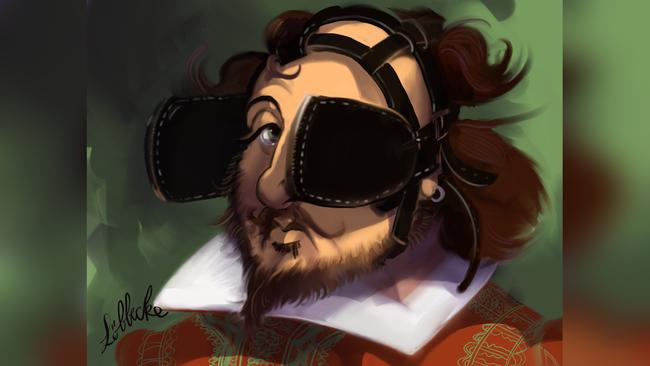Identity storm in a teacup became a tempest

I’d been asked to deliver the opening address of the Brisbane literary festival. The organisers had originally requested that I speak on the theme of “community and belonging”.
I told them for such a soft, sappy topic they had the wrong speaker. By all means, choose your own subject, they wrote back.
I proposed to speak about identity politics in fiction, and received wholehearted approval.
I chose to focus on a concept I’d only recently encountered, which at the time had primarily been used to castigate adventurous musicians and fashion designers. “Cultural appropriation” was a brand new taboo: “stealing” from other people’s traditions for your own evil creative purposes without “permission” — although it was baffling how one might go about securing such a licence.
In 2016, I was hard-pressed to come up with examples of this peculiar no-no being used to impugn works of fiction. Alas, only three years later I’d have found copious examples of fiction writers who’ve had their knuckles rapped for helping themselves to what didn’t belong to them.
Before delivering that lecture, I’d been solely concerned that my thesis was so self-evident that the speech would be boring.
MORE: Writers festival told ‘lies about crazed rant’ | Lionel Shriver on Q&A: Identity politics rules create weird literary apartheid | Cultural cowardice, identity politics a stifling mix | The fight for free speech
I advanced the moderate, commonsense proposition that to insist on authors writing only about people just like themselves would be to eliminate fiction altogether and leave only memoir.
The audience seemed genial and open to (the) address. Yet I was later informed that one audience member, a 24-year-old from Southern Sudan, flounced down the middle aisle and out of the venue.
The young woman, Yassmin Abdel-Magied — who has dined out on her rude exit ever since — promptly posted an indignant screed online about how deeply hurt and offended she was by my talk (much of which she did not hear). Said screed was so overwritten that it was actually funny.
Despite the overwrought prose, The Guardian, which has an increasingly, shall we say, ambivalent relationship to my politics, picked up the blog and posted it on the paper’s website.
The rest is history.


This tempest in an Australian teacup burst well beyond your borders. Media across the world piled on. This deluge of commentary was abundantly condemnatory, amid a few isolated voices of defence. And the story, such as there was one, was widely misreported.
The festival’s lies about my having gone off on some crazed, unauthorised rant were propagated everywhere. My final flourish of donning a sombrero — a droll little reference to the speech’s intro, and worn only during the last three words of the speech — was misdescribed in every account.
According to news reports, I’d worn the sombrero belligerently during the entire 45-minute address. Now, that was slanderous, too. I have a far better sense of theatre.
In private, I received a surprising quantity of supportive email, some from friends I didn’t know I had, but most of these defenders didn’t take a public stand.
It had been my intention to nip in the bud a poorly thought-out hard-left injunction that had the capacity, if widely applied, to make my occupation untenable. Instead I fear I helped spread the very concept that I’d hoped to discourage. Mea culpa. For “cultural appropriation” has in this past three years become widely regarded as forbidden in fiction.
Is it possible for authors of fiction to “aptly empathise†with worlds and identities that are not their own? #QandA pic.twitter.com/k8Y8O2AODR
— ABC Q&A (@QandA) September 2, 2019
I confess that I’m sick of this subject. Nevertheless, my opposition to this harebrained notion has grown only more implacable. Presumably if we white writers are prevented from using “stolen” material — if we’re required, in the latest lingo, to “stay in our lane” — then, clamouring for fiction about characters from Southern Sudan, the minority-starved reading public will turn Yassmin Abdel-Magied’s recent first novel into a bestseller. I fear this model displays a poor understanding of economics and publishing both.
When I was coming of age, we younger writers were eager to find mentors whom we admired. We inhaled the work of accomplished predecessors, the better to hone our own skills. We now have a generation that simply “cancels” the older generation, the better to clear the stage and clamber on to it. (None of these people read anymore, but mysteriously they all still want to be writers. Go figure.)
What I encountered in Brisbane hewed to an ugly behavioural model that has more in common with big game hunting than with art.
More fundamentally, I challenge the propositions that any of us “own” our own culture, that a culture is even subject to strict definition, and that a culture has any borders that can therefore be rigidly policed.
Thus, I would submit: we do not even own exclusive title to ourselves. I reject this hoarding, hostile, selfish relationship to “identity”. Better that we all conduct our work and social lives in a spirit of sharing, generosity, exploration, curiosity, experimentation, and even willingness to fail in our sincere efforts to understand one another.
This is an edited extract from Lionel Shriver’s John Bonython Lecture, which she delivered in Sydney on Tuesday night for the Centre for Independent Studies.



Don’t take this wrong but when I last left Australia in September of 2016, I vowed that I’d never come back.